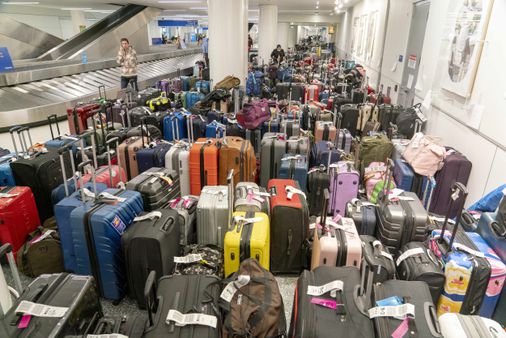While it’s always frustrating when a flight is significantly delayed or canceled altogether, there’s only so much airlines can do when it comes to severe weather events. But weather can’t be blamed for all the problems this past week: As of Tuesday, a single company, Southwest Airlines, accounted for about 85 percent of the roughly 3,000 canceled domestic flights. And though many of its flight paths were indeed disrupted because of bad weather, the airline only made matters worse with several internal logistical hurdles, including its inefficient scheduling system , which lost track of where pilots and crew members were after the initial cancellations.
Traveling for the holidays always comes with its fair share of anxiety, and that’s especially true for airline customers. A big winter storm somewhere could cause a ripple effect of flight cancellations across many of the nation’s airports, and that’s exactly what happened this holiday season. Major American cities got pummeled with what meteorologists call a “bomb cyclone” — not exactly the type of storm you’d want in the forecast if you were flying — and thousands of flights were canceled along with many more families’ holiday plans.
Advertisement
But even if weather was the sole reason for such a disastrous backlog of flights, what’s well within airlines’ control, regardless of rain or snow, is how they treat their customers when cancellations do happen. And for US air travelers, getting compensated for flight delays or cancellations has always been a hassle that often requires customers to jump through all sorts of hoops — and be put on hold for hours on customer service lines — for something as simple as a refund, which they are legally entitled to.
Get Today in Opinion Globe Opinion’s must-reads, delivered to you every Sunday-Friday. Enter Email Sign Up
That’s unacceptable. People shouldn’t have to be burdened with extra expenses, such as transportation or hotel costs, because of a canceled flight, and they shouldn’t have to navigate a messy bureaucracy to get the compensation they deserve. Southwest has said it will honor “reasonable” reimbursement requests from travelers, though even getting through to the company was a challenge this week. Going forward, federal regulators should strengthen consumer protections for airline passengers so that consumers can easily find out what kind of compensation they are entitled to and so that airlines swiftly and smoothly refund or reimburse affected customers.
Advertisement
Under the Biden administration, the Department of Transportation has taken some steps to better protect consumers. Earlier this year, for example, the agency launched an online dashboard that shows customers exactly which services each airline commits to doling out in the event of a delay or cancellation. That could be anything from rebooking customers onto different flights free of charge to meal or hotel vouchers.
The Department of Transportation has also argued for going much further, putting forward a proposal to expand air travelers’ rights. The proposed rule change would, among other things, better define what constitutes a canceled or significantly delayed flight, which would leave less room for airlines to snub passengers’ requests for refunds they should already have a right to. Those changes have yet to be adopted but the department’s Aviation Consumer Protection Advisory Committee will vote on the proposal in January; it would be wise for the committee to approve the proposal.
But there’s more that federal lawmakers should be doing. Under European Union regulations, airline companies are required to not only refund passengers for a canceled or delayed flight but to compensate them for the inconvenience. As the Department of Transportation’s dashboard shows, many American airlines have committed to doing the same, sometimes through vouchers as opposed to direct cash payments. But while US regulations require that airlines refund passengers for canceled or delayed flights, any added compensation is voluntary on the part of the airline.
Advertisement
Senators Ed Markey of Massachusetts and Richard Blumenthal of Connecticut had the right idea when they urged Southwest to make up for the disruption the airline caused its passengers, not just reimbursing expenses but also by offering “significant monetary compensation for the disruption to their holiday plans.”
Hopefully Markey and Blumenthal can convince their Capitol Hill colleagues to hold all airlines to that higher standard before the next winter holiday season.
Editorials represent the views of the Boston Globe Editorial Board. Follow us on Twitter at @GlobeOpinion.



